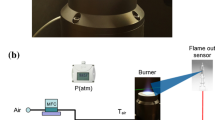Abstract
Reduced gravity droplet combustion experiments were performed on the International Space Station (ISS). The data from these droplet combustion experiments have been made publicly available by NASA. These experiments utilized narrow-band and wide-band radiometers to measure thermal radiation heat fluxes from flames. The initial set of radiometers, which were used in 80 experiments, exhibited large noise levels, making interpretation of data from these experiments difficult. The noisy radiometers were replaced by NASA with a second set of radiometers that had significantly less noise. The work presented here is focused on: (1) evaluating methods to “denoise” the data from the initial (noisy) set of radiometers with a goal of detecting flame oscillations; and (2) making these denoising methods available to other researchers who would like to analyze the noisy radiometer data. The denoising efforts employed local polynomial regression analysis with a Gaussian kernel as well as frequency-based low-pass filters. Windowed Fourier transform and wavelet transform approaches were also employed to detect flame oscillations in radiometer data. Comparison of results from these approaches showed that local polynomial analyses and also wavelet transforms can detect the presence of flame oscillations in noisy radiometer data. Uncertainties in the noisy radiometer data were evaluated using a Monte Carlo bootstrapping approach.







Similar content being viewed by others
Abbreviations
- SNR :
-
signal to noise ratio
- a j :
-
regression coefficient estimate
- x :
-
generic independent variable
- y c :
-
fitted polynomial
- K :
-
kernel of the local polynomial regression curve fit
- x o :
-
point of evaluation of the evaluation of the local polynomial
- h :
-
standard deviation, bandwidth of the Gaussian kernel
- y i :
-
generic dependent variable
- μ :
-
mean noisy radiometer reading during the pre-ignition phase
- σ 2 :
-
standard deviation of radiometer reading during the pre-ignition phase
- WT :
-
wavelet transform
- NASA:
-
National Aeronautics and Space Administration
- ISS:
-
International Space Station
- WFT :
-
windowed Fourier transform
- MDCA :
-
Multi-user Droplet Combustion Apparatus
- ψ :
-
mother wavelet
- t :
-
time
- τ :
-
time translation parameter
- ψ ∗ :
-
mother wavelet complex conjugate
- BW :
-
bandwidth factor
- M :
-
length of the Sinc function kernel of the low pass filter
- 𝜖 :
-
regression analysis residual
- 𝜖 ∗ :
-
bootstrapped residual
- y ∗ :
-
bootstrapped radiometer value
- i :
-
ith data point
- j :
-
jth replicate of the Monte Carlo simulation
- V :
-
volts
- s :
-
seconds
- H z :
-
hertz
References
Dietrich, D.L., Ferkul, P.V., Bryg, V.M., Nayagam, M.V., Hicks, M.C., Williams, F.A., Dryer, F.L., Shaw, B.D., Choi, M.U.N.Y., Avedisian, C.T.: Detailed results from the flame extinguishment experiment (FLEX) March 2009 to December 2011. Technical Report, NASA (2015)
Dietrich, D.L., Nayagam, V., Hicks, M.C., Ferkul, P.V., Dryer, F.L., Farouk, T., Shaw, B.D., Suh, H.K., Choi, M.Y., Liu, Y.C., Avedisian, T., Williams, F.A.: Droplet combustion experiments aboard the international space station. Microgravity Sci. Tech. 26(2), 65–76 (2014). ISSN 0938-0108. https://doi.org/10.1007/s12217-014-9372-2
Ikeda, M.: Effects of gravity on ignition and combustion characteristics of externally heated polyethylene film, vol. 30. https://doi.org/10.1007/s12217-018-9606-9 (2018)
Olson, Sandra, Ferkul, Paul: Evaluating material flammability in microgravity and martian gravity compared to the nasa standard normal gravity test 07. https://doi.org/10.2514/6.2012-3492 (2012)
Payne, C.: Physical sciences informatics (psi). https://www.nasa.gov/PSI (2020)
Robert, C.P., Casella, G. 1: Introducing Monte Carlo Methods with R (Use R), 1st edition, pp 24–25. Springer, Berlin (2009). ISBN 1441915753, 9781441915757
Roesch, A., Schmidbauer, H.: WaveletComp: Computational Wavelet Analysis. https://CRAN.R-project.org/package=WaveletComp. R package version 1.1. (2018)
Schmidbauer, H., Roesch, A.: WaveletComp 1.1: A guided tour through the R package. https://pdfs.semanticscholar.org/3825/de34e8ae27624eece03abf6fbb8fd07c795a.pdf. 03. Accessed August 13,2019 (2018)
Shaw, B.D.: Uncertainty analysis of experimental data with R. Taylor & Francis. 1st edition, 01. https://doi.org/10.1201/9781315366715 (2017a)
Shaw, B.D.: Uncertainty analysis of experimental data with R. chapter 4, 67–69. Taylor & Francis, 1st edition (2017b)
Shaw, B.D., Vang, C.L.: Oxygen lewis number effects on reduced gravity combustion of methanol and n-heptane droplets. Combust. Sci. Tech. 188(1), 1–20 (2016). ISSN 0010-2202. https://doi.org/10.1080/00102202.2015.1072176
Smith, S.W.: The Scientist and Engineer’s Guide to Digital Signal Processing. California Technical Publishing, San Diego (1997). ISBN 0-9660176-3-3
Takahashi, F., Katta, V.R., Hicks, M.C.: Cool-flame burning and oscillations of envelope diffusion flames in microgravity. Microgravity Sci. Technol. 30(4), 339–351 (2018). https://doi.org/10.1007/s12217-018-9630-9
Vang, C.L., Shaw, B.D.: Evaluation of free-floating droplet acceleration in ISS droplet combustion experiments. Microgravity Sci. Technol. 32(3), 531–543 (2020). https://doi.org/10.1007/s12217-019-09752-4
Williams, F.A.: Flame Extinguishment Experiment. https://www.nasa.gov/mission_pages/station/research/experiments/explorer/Investigation.html?#id=655. Accessed August 13,2019 (2019)
Acknowledgements
We appreciate discussions with C. T. Avedisian, M. Y. Choi, D. L. Dietrich, F. L. Dryer, M. Hicks, V. Nayagam, and F. A. Williams. We also express our sincere gratitude to the management, engineering, and operations teams at NASA and Zin Technology, Inc. and the ISS astronauts who participated in the experiments. The assistance of C. L. Vang with certain aspects of using R for data analysis is also appreciated.
Author information
Authors and Affiliations
Corresponding author
Ethics declarations
Conflict of interests
The authors declare that they have no conflict of interest.
Additional information
Publisher’s Note
Springer Nature remains neutral with regard to jurisdictional claims in published maps and institutional affiliations.
This research was supported by NASA through grant NNX14AK01G. The Technical Monitor was Dr. Daniel L. Dietrich.
Rights and permissions
About this article
Cite this article
Das, S., Shaw, B.D. Analysis of Noisy Radiometer Data from ISS Reduced Gravity Droplet Combustion Experiments. Microgravity Sci. Technol. 33, 2 (2021). https://doi.org/10.1007/s12217-020-09858-0
Received:
Accepted:
Published:
DOI: https://doi.org/10.1007/s12217-020-09858-0




